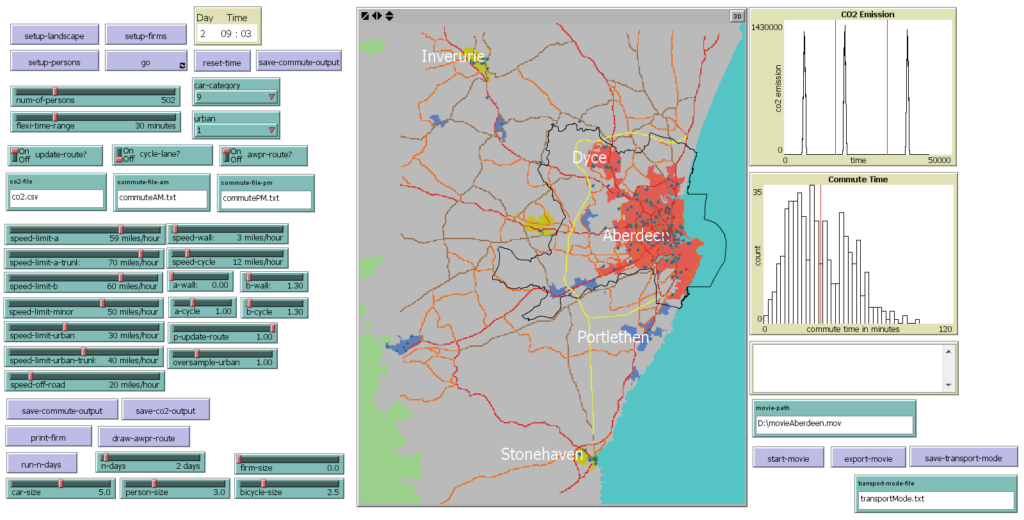Too much of a good thing?
By Jiaqi Ge, Gary Polhill and Tony Craig
Imagine you could choose to work at any of the workplaces in Aberdeen City and Shire, anywhere. How would that change your life? Would it make your life easier, now you don’t need to be stuck in the traffic for so long? Would you still come to your own office, because you: have spent a lot of time decorating it, want to see your good old colleagues, live close by anyway, or simply like drinking coffee in the canteen and riding the bus to work?
Now, imagine everyone in the Aberdeen City and Shire region could work in any workplace. While you may be able to figure out the best action to take as an individual in the situation, having hundreds of thousands of other independent-minded individuals doing the same at the same time will change the whole picture. For example, you faithfully come into your office as usual to meet and collaborate with your colleagues, only to find that they are all working elsewhere now. Or, you decide to take the shorter and less congested route to a nearby workplace, only to be stuck again on the road because many others have the same idea. Or, you might have a nice nearby workplace in mind, only to be told off by your boss or your other team members.
The whole is rarely best understood as the simple sum of the parts, far from it. Often, well-intentioned national, regional, or organisational policies can lead to undesirable and unintended consequences because they naively assume that the aggregated effect is simply the multiplication of individual effect. Using an agent-based model of the daily commute in Aberdeen and surrounding area, we found that the apparently attractive ‘win-win’ policies of workplace sharing can be negated by unseen factors such as informal working practices in workplaces. The aggregated systemic effect is highly context sensitive, and nothing as clear-cut as suggested by the isolated individual effect. We can indeed have too much of a good thing! The unexpected systemic effect often comes from the interactions among the individuals and between individuals and their surroundings. While analytical models often omit such interactions, they can be captured by agent-based simulation models.
Earlier, we used the agent-based model to explore combined effect of factors influencing commuting patterns and CO2 emissions in Aberdeen. Again, we found unexpected systemic effects emerge from individual interactions. For example, we found that flexi-time (a flexible range of times at which you can arrive at work) not only reduces commute time significantly, but also makes the time spent commuting more reliable and reduce CO2 emission from traffic. In comparison, a new bypass will only reduce mean commute time by a small amount, while slightly increasing total CO2 emissions.
Sometimes, policy solutions that make perfect sense at a surface level can lead to unintended consequences because, although people make decisions independently, the effects of those decisions are played out in a shared space. The world is a complex place with everyone and everything connecting and interacting with each other.
The whole is more than the sum of the parts.
Want to find out more about our methodology and results? We have published two papers regarding transport simulation and policy:
Paper on workplace sharing programmes: https://www.sciencedirect.com/science/article/pii/S0966692317303356 (free access until 14 June 2018 at https://authors.elsevier.com/a/1Wxhv3RpEOBX8y)
Paper comparing flexi-time and road construction to reduce congestion in peak hours (open access): http://jasss.soc.surrey.ac.uk/19/3/11.html


